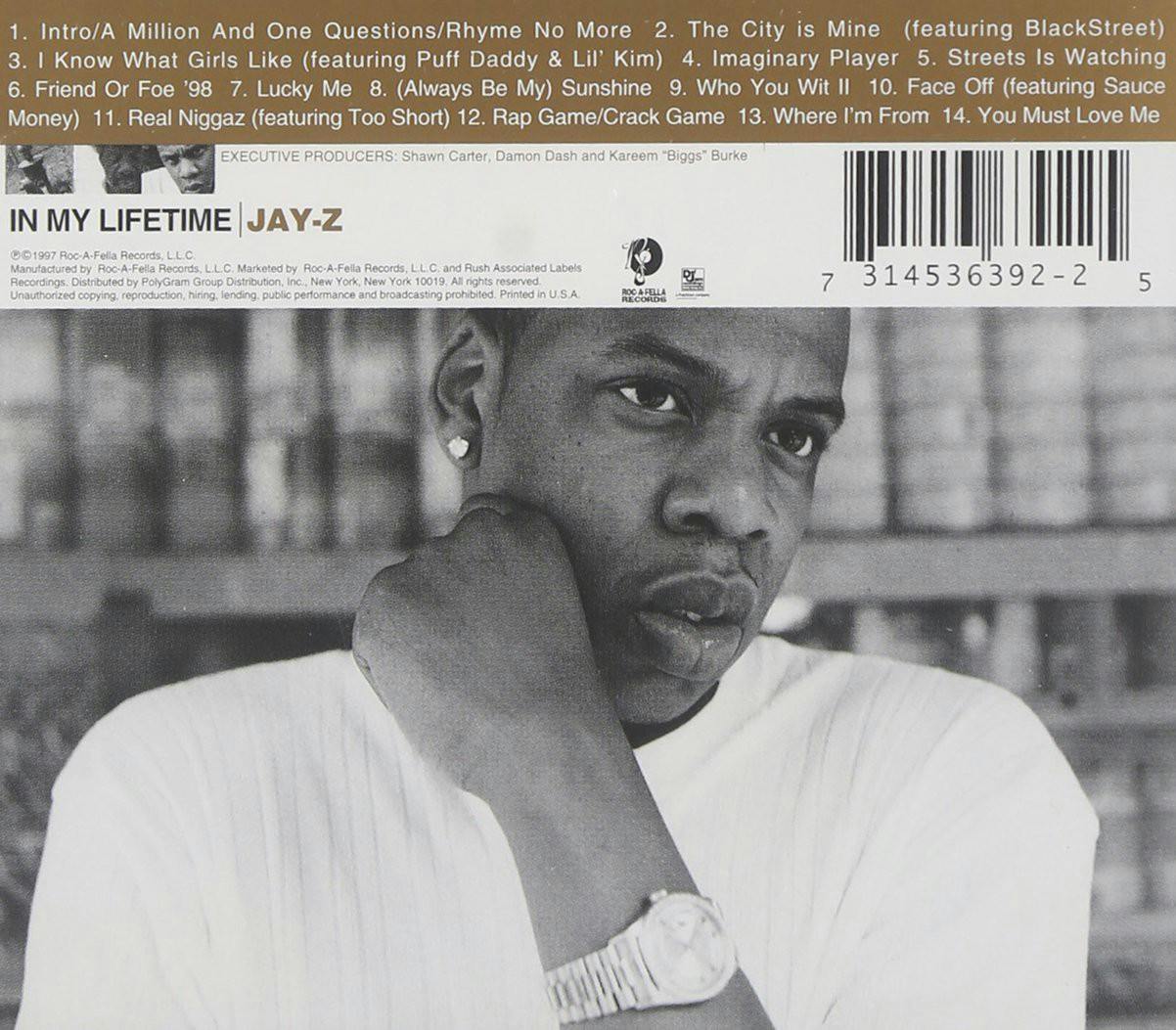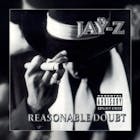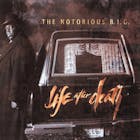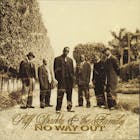
Classic Albums: 'In My Lifetime, Vol. 1' by Jay-Z
Classic Albums: 'In My Lifetime, Vol. 1' by Jay-Z
Published Sat, November 5, 2022 at 7:00 PM EDT
Should an album be considered a classic if even the artist who made it DOESN'T consider it to be one?
Jay-Z is famously critical of his sophomore album. When In My Lifetime, Vol. 1 hit shelves in 1997, Hip-Hop was knee-deep in the so-called "Shiny Suit Era," a Sean "Puffy" Combs-driven period of splashy, colorful videos, and infectious hooks over glossy samples of 80s hits. The formula had landed major rap chart-toppers throughout the year, from Puff's Bad Boy mainstays "Feels So Good" by Ma$e and "Mo Money Mo Problems" from the late Notorious B.I.G.; to more eclectic crossover smashes like Wyclef Jean's "We Trying To Stay Alive" and Missy's "Supa Dupa Fly." Jay had been friends with Biggie, who's March 1997 murder was often credited as the catalyst for mainstream rap music diving headfirst into fun, danceable pop hits in the months after that tragedy.
Even though the Ski-produced "Who Ya Wit" was released a single in the summer of 1997, that hit was featured prominently on the soundtrack for the comedy Sprung. As such, the first official single from Jay's second album was the slick "(Always Be My) Sunshine." The song prominently samples "The Man-Machine" from Kraftwerk (also memorably flipped for MC Lyte's "Cha Cha Cha") and boasts a Babyface hook and Foxy Brown guest appearance. The song itself seemed to only moderately reflect the pop-rap approach of Bad Boy, but it's music video became notoriously panned for what fans felt was Shiny Suit-isms that were already starting to look cliche. The Hype Williams-directed clip featured an ill-used fisheye lens (quickly becoming a Hype trademark but a poor fit here) and Jay rapping in what looked like a giant Rubik's cube. Roc-A-Fella Records head Damon "Dame" Dash would later say they should've never done the visual in that style.
But the "damage" was done. Jay's second album was immediately branded with the dreaded "Shiny Suit" tag. In essence, a bad video obscured what turned out to be a great album.
DROP YOUR EMAIL
TO STAY IN THE KNOW
It's unfortunate that In My Lifetime, Vol. 1 has such a controversial stature, because it's one of Jay-Z's best early albums, even if it's better served with the benefit of hindsight. Outside of the glossy singles, Jay delivers an assured follow-up to 1996's Reasonable Doubt, and the moments where the album gets trapped in its time period are few and far between. Songs like "Friend Or Foe II" hearken back to his classic first album without completely rehashing it's best moments; and Jay's ambition to assume the proverbial throne post-Biggie is absolutely evident in almost every track.
Between Reasonable Doubt and In My Lifetime, Vol. 1, Roc-A-Fella inked a major deal with Def Jam Recordings. The 50/50 deal lead to some difficulties, as former Roc-A-Fella affiliates like Sauce Money and Jaz-O split away from the label after working on this particular album. Jaz contributed production to another street track, the kinetic "Rap Game/Crack Game," which breaks down the similarities between the two. Sauce Money spars with Jay on the party anthem "Face Off," which also serves as a lyrical showcase for the two emcees.


"U Must Love Me" is produced by Nashiem Myrick and features a then-unknown Kelly Price, who would break big the following year with "Friend Of Mine" is one of the album's most beloved tracks, for good reason. Jay-Z's introspection was often overshadowed in the late 1990s by his flossy ambitions and undeniably cockiness, but on "...Love Me," Jay gets dead serious about two of his most regrettable moments as a youth: selling his own mother crack, and shooting his brother over jewelry. "It was terrible," Jay told WEEKEND Magazine in 2018. "I was a boy, a child. I was terrified."
Over the solemn sample of The O'Jays' "What Am I Waiting For," Jay revisits his mistakes, recounting in explicit detail the night the then-12-year old shot his drug addicted older brother. Jay's friend and mentor, Jaz-O would subsequently share that it was Jaz who gave Jay the gun that he eventually shot his brother with; and Jay came to Jaz shortly after the incident.
“He ran to my crib because you bust a gun, I don’t care who you are, you get nervous," Jaz-O would tell Vlad years later. "You get nervous and you need somewhere to run to, so I guess he was like, ‘Let me run over to this nigga’s house and drop this shit off for worst-case scenario.’ So he came up there and dropped it off and everything.”
"A Million and One Questions," the Aaliyah-sampling opener, is the grittier half of the two-part album-opening salvo; and features Jay shouting out the street hustling environment from whence he rose and once again reveling in his street game bonafides—before segueing into the jazzy groove of "Rhyme No More," which sounds like a reminder of Reasonable Doubt's sound and feel. Jay's Marcy Projects upbringing looms over and lingers throughout the spirit of In My Lifetime, Vol. 1. Where Reasonable Doubt seemed to be squarely focused on an ambitious hustler's rap game (and crack game) aspirations, ...Lifetime goes a long way towards establishing (and mythologizing) long-standing themes surrounding Jay's hardscrabble background, best illustrated in the stellar hood anthem "Where I'm From."
But Jay's flossier side is also very much ever present on the album. "Imaginary Players" could be considered an opening shot for the kind of luxury rap bravado that would soon become standard. Rappers had more or less always bragged about material riches, from Big Bank Hank's color tv to Biggie's Versace fetish; but Jay helped push things into another sphere of conspicuous consumption. And in the meantime, the song also featured subliminal shots at the newly-minted Bad Boy star, Ma$e. His debut album Harlem World would be a multiplatinum success, and Ma$e later explained that he and Jay had bad blood.
Ma$e told MTV in 2012 that a woman named Arion was in the middle of his issues with Hov.
“It was a girl, she liked me. We did whatever we did. And it was somebody's girlfriend that was in [Jay-Z's] crew,” he told Sway. “So then, me and Dame get into it. Dame wanna box with me, I tell him, 'Let's box.' We didn't end up boxing, everybody broke it up on 125th. I guess Jay inherited it because me and him never really had a problem. He said something, I said something back and that was about it."
More recently, Ma$e revisited the issue.
“I think I said something on a record and people kind of put it towards Hov, when really I was just trying to be the best,” Ma$e told Gillie da Kid and Wallo earlier this year. “Cause me and Hov and Busta [Rhymes], we all dropped on the same day. And after my joint sold, I was just talking crazy everywhere, so I might’ve got out of pocket. I was 19, 20, I’m feeling it!”
On "Imaginary Players," Jay pointedly rapped:

And now, you got these young cats/Acting like they slung caps/ All in their dumb raps/Talking 'bout how their funds stack/ When I see them in the street—I don't see none of that/ Damn playboy—where the fuck is the Hummer at?”
But another aspect of the album that ruffled feathers was Jay's implying that New York City's rap crown now belonged to him in the wake of the death of The Notorious B.I.G. Jay never disrespected the late Brooklyn icon's legacy, but he positioned himself as the natural heir to the throne, something that critics considered premature considering Jay had only delivered one album (albeit a widely-acclaimed one) that had struggled to go gold. Against the multiplatinum stature that had suddenly become an important talking point, Jay's reach was meager. Songs like "The City Is Mine" seemed to announce the ambitious young Jigga as East Coast rap's newest king, even though he wasn't actually quite there yet. It was all quite audacious.
The clear misses on the album ("I Know What Girls Like" is a tepid retread of the new wave hit by The Waitresses, and inarguably the worst track here) don't take away from what's an immaculately produced set of songs that straddle the line between slick and street very effectively. When it was released in the fall of 1997, In My Lifetime, Vol. 1 gave Jay-Z his first platinum-seller, despite the fact that the critical reception was mixed. A few months after it's release, Roc-A-Fella would release the Streets Is Watching video and soundtrack, featuring mostly songs from In My Lifetime. That would retroactively boost the album's popularity and essentially set the table for Jay's major breakthrough in late 1998 with Vol. 2 Hard Knock Life.
But Jay-Z does not like his second album. The rapper made that clear yet again last year, after Questlove tweeted his admiration for In My Lifetime, Vol. 1. The project has grown in stature over the years, and the talented multi-hyphenate shared that he and Jay himself have openly disagreed over the legacy of ...Lifetime.
“Our main argument is his hate for Vol 1,” Questlove wrote. “He is embarrassed for trying to make a monster & not putting numbers up. But ALOT of this lp contains his best moments. Fight me @sc.”
The tweet prompted a retort from Jay himself. In rare moment, the mogul chimed in on his dismissal for In My Lifetime. Jay-Z indicated that he sees the album as a missed opportunity to make something stronger.
Agreed," Jay tweeted. "More so, I know what could have been, so it haunts me … streets is watching was the first song made !”






